Bill Bryson, an American author of humorous travel and popular history or science books, is considered a national treasure in his adopted Great Britain. He is a particular favourite of my husband and in-laws, who got me into his work back in the early to mid-2000s. As I, too, was falling in love with the country, I found much to relate to in his travel-based memoirs of expatriate life and temporary returns to the USA. Sometimes it takes an outsider’s perspective to see things clearly.
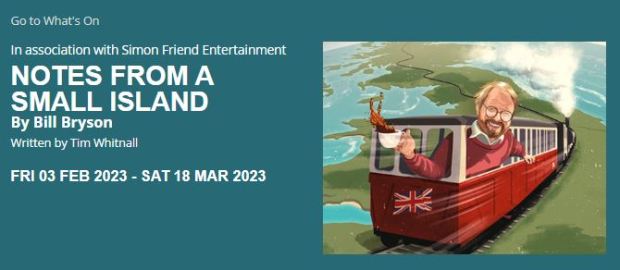
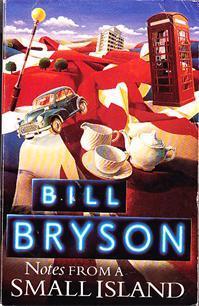 When we heard that Notes from a Small Island (1995), his account of a valedictory tour around Britain before returning to live in the States for the first time in 20 years, had been adapted into a play by Tim Whitnall and would be performed at our local theatre, the Watermill, we thought, huh, it never would have occurred to us to put this particular book on stage. Would it work? we wondered. The answer is yes and no, but it was entertaining and we were glad that we went. We presented tickets as my in-laws’ Christmas present and accompanied them to a mid-February matinee before supper at ours.
When we heard that Notes from a Small Island (1995), his account of a valedictory tour around Britain before returning to live in the States for the first time in 20 years, had been adapted into a play by Tim Whitnall and would be performed at our local theatre, the Watermill, we thought, huh, it never would have occurred to us to put this particular book on stage. Would it work? we wondered. The answer is yes and no, but it was entertaining and we were glad that we went. We presented tickets as my in-laws’ Christmas present and accompanied them to a mid-February matinee before supper at ours.
A few members of my book club decided to see the show later in the run and suggested we read – or reread, as was the case for several of us – the book in March. I started my reread before attending the play and had gotten through the first 50 pages, which is mostly about his first visit to England in 1973 (including a stay in a Dover boarding-house presided over by the infamously officious “Mrs Smegma”). This was ideal as the first bit contains the funniest stuff and, with the addition of some autobiographical material from later in the book plus his 2006 memoir The Life and Times of the Thunderbolt Kid, made up the entirety of the first act.
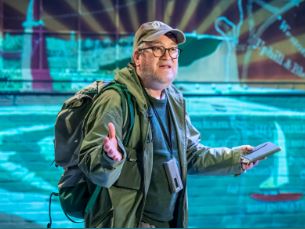
Photos are screenshots from the Watermill website.
Bryson traveled almost exclusively by public transport, so the set had the brick and steel walls of a generic terminal, and a bus shelter and benches were brought into service as the furnishing for most scenes. The problem with frontloading the play with hilarious scenes is that the second act, like the book itself on this reread, became rather a slog of random stops, acerbic observations, finding somewhere to stay and something to eat (often curry), and then doing it all over again.
Mark Hadfield, in the starring role, had the unenviable role of carrying the action and remembering great swathes of text lifted directly from the book. That’s all well and good as a strategy for giving a flavour of the writing style, but the language needed to be simplified; the poor man couldn’t cope and kept fluffing his lines. There were attempts to ease the burden: sections were read out by other characters in the form of announcements, letters or postcards; some reflections were played as if from Bryson’s Dictaphone. It was best, though, when there were scenes rather than monologues against a projected map, because there was an excellent ensemble cast of six who took on the various bit parts and these were often key occasions for humour: hotel-keepers, train-spotters, unintelligible accents in a Glasgow pub.
The trajectory was vaguely southeast to northwest – as far as John O’Groats, then back home to the Yorkshire Dales – but the actual route was erratic, based on whimsy as much as the availability of trains and buses. Bryson sings the praises of places like Salisbury and Durham and the pinnacles of coastal walks, and slates others, including some cities, seaside resorts and tourist traps. Places of personal significance make it onto his itinerary, such as the former mental asylum at Virginia Water, Surrey where he worked and met his wife in the 1970s. (My husband and I lived across the street from it for a year and a half.) He’s grumpy about having to pay admission fees that in today’s money sound minimal – £2.80 for Stonehenge!
 The main interest for me in both book and play was the layers of recent history: the nostalgia for the old-fashioned country he discovered at a pivotal time in his own young life in the 1970s; the disappointments but still overall optimism of the 1990s; and the hindsight the reader or viewer brings to the material today. At a time when workers of every type seem to be on strike, it was poignant to read about the protests against Margaret Thatcher and the protracted printers’ strike of the 1980s.
The main interest for me in both book and play was the layers of recent history: the nostalgia for the old-fashioned country he discovered at a pivotal time in his own young life in the 1970s; the disappointments but still overall optimism of the 1990s; and the hindsight the reader or viewer brings to the material today. At a time when workers of every type seem to be on strike, it was poignant to read about the protests against Margaret Thatcher and the protracted printers’ strike of the 1980s.
 The central message of the book, that Britain has an amazing heritage that it doesn’t adequately appreciate and is rapidly losing to homogenization, still holds. Yet I’m not sure the points about the at-heart goodness and politeness of the happy-with-their-lot British remain true. Is it just me or have general entitlement, frustration, rage and nastiness taken over? Not as notable as in the USA, but social divisions and the polarization of opinions are getting worse here, too. One can’t help but wonder what the picture would have been post-Brexit as well. Bryson wrote a sort-of sequel in 2015, The Road to Little Dribbling, in which the sarcasm and curmudgeonly persona override the warmth and affection of the earlier book.
The central message of the book, that Britain has an amazing heritage that it doesn’t adequately appreciate and is rapidly losing to homogenization, still holds. Yet I’m not sure the points about the at-heart goodness and politeness of the happy-with-their-lot British remain true. Is it just me or have general entitlement, frustration, rage and nastiness taken over? Not as notable as in the USA, but social divisions and the polarization of opinions are getting worse here, too. One can’t help but wonder what the picture would have been post-Brexit as well. Bryson wrote a sort-of sequel in 2015, The Road to Little Dribbling, in which the sarcasm and curmudgeonly persona override the warmth and affection of the earlier book.
Indeed, my book club noted that a lot of the jokes were things he couldn’t get away with saying today, and the theatre issued a content warning: “This production includes the use of very strong language, language reflective of historical attitudes around Mental Health, reference to drug use, sexual references, mention of suicide, flashing lights, pyrotechnics, loud sound effect explosions, and haze. This production is most suitable for those aged 12+.”
So, yes, an amusing journey, but a bittersweet one to revisit, and an odd choice for the stage.
A favourite line I’ll leave you with: “To this day, I remain impressed by the ability of Britons of all ages and social backgrounds to get genuinely excited by the prospect of a hot beverage.”
Book:
Original rating (c. 2004): 
My rating now: 
Play: 
Have you read anything by Bill Bryson? Are you a fan?
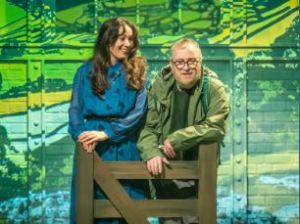
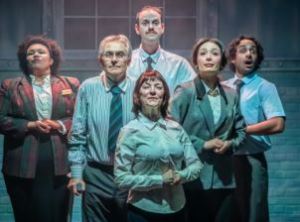
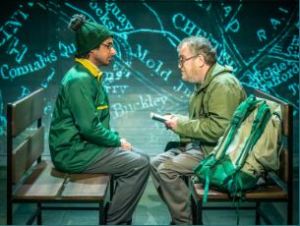
It’s true, I do get genuinely excited about my morning coffee! I’m not sure I could reread this, and I’d agree with your assessment of Britain’s current state. My hope is that the tide will begin to turn late next year or in early 2025.
LikeLiked by 1 person
It’s good to take pleasure in little things! It means every day contains things to look forward to.
We’re also hopeful that the political wind will change.
LikeLiked by 1 person
I remember enjoying Small Island a lot, but as I rarely re-read, I reckon this one won’t make the cut. But Little Dribbling really was not half as satisfactory, for the reasons you advance.
LikeLiked by 1 person
I remember it still had its funny moments but he seemed to pick easy targets for jokes.
LikeLike
As a small child I once drew stares by reading, out loud on a public beach, the part of Notes from a Small Island where he’s talking about what constitutes headline news in the US vs the UK (it contained a reference to the Lorena Bobbitt case—my mum snatched it out of my hands!) It’s so interesting to read Bryson as historical documentation, which is how I now do read his earlier work. I think that, a bit like Terry Pratchett, though hopefully not for the same reason, his persona has soured as he’s gotten older. I don’t read his new travel work at all (anything post-In a Sunburned Country/Down Under), and his science/social history stuff hasn’t impressed me much apart from A Short History of Nearly Everything, which I continue to love.
LikeLiked by 4 people
That’s a cute image of you as a bookish child! When the Lorena Bobbitt case was all over the news I remember asking my mom, “but how does he go to the bathroom?!”
My husband thinks A Walk in the Woods is his best book. I’d reread that one, I think. I’ve never read A Short History of Nearly Everything but would like to. You should make an exception for The Body — that was fantastic!
LikeLiked by 1 person
Apparently it was reattached with no substantial loss of function. (He was in two adult films afterwards!)
A Walk in the Woods is excellent, and a true comfort read for me. I did actually listen to The Body on audio! It didn’t have the sparkle of ASHONE, which was a bit disappointing.
LikeLiked by 1 person
We, as foreigners (Norwegian and German) living for more than 40 years in England, agree with a lot of how BB sees the British. We like BB’s books.
By the way, Bryson lived not that far from where we live.
Thanks and cheers
The Fab Four of Cley
🙂 🙂 🙂 🙂
LikeLiked by 1 person
He’s lived in a few places in the UK, I think, including the Yorkshire Dales and now Hampshire. It is fun to see how outsiders characterize a country’s quirks.
LikeLiked by 1 person
I read this nowadays almost as a historical snapshot of the British, just like I would George Mikes’ ‘How to be an Alien’ or Karel Capek’s Letters from England. Incidentally, I also recently came across a fairly withering assessment of expats of the British Empire in ‘Embers’ by Márai Sándor.
LikeLiked by 1 person
That’s a good way of thinking about it. I still found the Mikes books very amusing when I read them a few years back. There was a lot that rang true even now.
LikeLiked by 1 person
I’ve only read his Shakespeare bio (very straightforward while detailed) and Mother Tongue, but both those many years ago. My copy of his Troublesome Words is, inexplicably, still unopened though I’ve had it for a couple of decades; I’ve now a yearning to reacquaint myself with all three titles, but I’ve none at all for his UK travel books – I already have a jaundiced view of many aspects of British life, quirky or unpleasant as much of it now is (as you know too well).
LikeLiked by 1 person
I haven’t read his language books, though I do own both of those plus Made in America, I think. I’ve seen him speak twice, once on a book tour — alas, he was suffering from bursitis so couldn’t do a signing, else I would have had my copy of Troublesome Words signed.
LikeLiked by 1 person
Wow! I didn’t remember all that from Road to Little Dribbling.
LikeLike
The attitude change, you mean? It would mostly be noticeable if you’re familiar with his earlier work, when he seemed more affable.
LikeLiked by 1 person
I think I read Little Dribbing first and then Small Island. So, that’s probably why I didn’t notice.
LikeLike
I read and enjoyed the one in Australia, and liked Walk in the Woods. I keep meaning to read more by him and never get around to it.
LikeLiked by 1 person
Those are probably two of his best, and I should hope have dated less than some of the others.
LikeLiked by 1 person
I have just finished The Body, which was wonderfully full of weird and wonderful facts that were worth reading out loud to anyone in earshot. As for A Short History of Nearly Everything, I read the first couple of chapters years ago and it’s been parked at the bottom of the pile next to my bed ever since. Funnily enough, we have another copy because my mostly non-reading husband bought a copy when he was on a business trip, not realising I already owned it. Mother Tongue was fascinating and I thought I’d read and enjoyed Notes on a Small Island, but I suspect I’m confusing it it with Paul Theroux’s Kingdom of the Sea, which I want to reread. So in actual fact, what I remember enjoying was really The Lost Continent and Neither Here Nor There. I should reread the latter, too, because when I read it I hadn’t travelled at all and now I’ve lived in or visited many of the places mentioned.
LikeLiked by 1 person
The Body is a favourite of mine and would probably be less likely to seem dated than any of his other books on a reread. He actually references Theroux’s Kingdom by the Sea in Notes from a Small Island, so was conscious he was replicating that journey to an extent. I do always feel I get more out of a travel book if I have some familiarity with the places visited.
LikeLike
I started off as a fan but he got a bit silly. I think he did one about houses I did enjoy, but gave up on Thunderbolt Kid. And I fear you’re right and we are a less kind people now.
LikeLiked by 1 person
Perhaps At Home would be one to reread. I’ve still never read A Short History of Nearly Everything but have always meant to.
LikeLiked by 1 person
I loved the book at the time it was published but it sounds a very odd choice for a play. It’s just a series of anecdotes essentially with no real through plot or drama.
LikeLiked by 1 person
Indeed. It was best when they pulled out scenes, even small things like encounters on a Tube platform or with a hotel keeper.
LikeLike
What a fun play to go see! I have liked the Bill Bryson books I’ve read or listened to, but it might only be two so far. I read A Walk in the Woods a long time ago and I will never forget the scene with the bear. And I recently listened to The Body on audio, which I also enjoyed but didn’t find as funny. I have a couple more on hold, including A Short History of Nearly Everything but they’re very popular and haven’t gotten to me yet. I think ASHONE is a wait of several months!
LikeLiked by 1 person
Wow, such a long waiting list for a book that came out 20 years ago! I still have that one to read. He’s so good at conveying lots of information in an entertaining fashion. And even if some of his opinions now seem dated, he is always a delightful tour guide in his travel books.
LikeLiked by 1 person
I don’t know if it’s because it’s such a good book (I’m hoping!), or if it’s because it’s 18 hours long so people need to keep it for the whole 2 weeks.
LikeLiked by 1 person
Ha, that does seem long! I’ve heard of people putting the audiobook onto double speed to try to get through books faster, but that sounds stressful to me.
LikeLike
[…] a few months after Notes from a Small Island, it was back to one of my local theatres, The Watermill, for the stage adaptation of another book […]
LikeLike
[…] Collection, due to the enthusiastic recommendations from Susan, our Arran hosts, and Bill Bryson in Notes on a Small Island (“Among the city’s many treasures, none shines brighter, in my view”). It’s a museum with a […]
LikeLike
[…] that made me laugh: Notes from a Small Island by Bill Bryson, The Librarianist by Patrick deWitt, two by Katherine Heiny, Motherland Fatherland […]
LikeLike